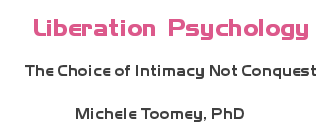|
So much of how we share and connect takes place around shared memories. When memory becomes a central issue, and memory loss is such a loud factor, sharing is often sad and painful. How can we feel connected when the memory is no longer available? It can't be shared. Sadness and isolation are immediate replacements. Brain damage exacts a heavy toll, yet again.
The isolation must be dealt with if there is to be any intimacy with ourselves or each other. To deal with it translates into allowing ourselves to feel it, name it, and express it. By sharing the feelings of isolation it is already not an isolating experience. It immediately takes us to sadness, together, within ourselves and with each other. Sad together the isolation is broken and intimacy occurs.
The sadness must be dealt with by touching it and expressing it. Embracing it within allows us to be embraced first by ourselves and then by others. Shared sadness is intimate and soothing. We can be emotionally and often physically held as we share our sadness. Certainly not isolating and certainly a deeply intimate experience.
Once again, the paradox. The heavy toll of brain damage yields, or can yield, a treasured gift of intimacy. We can be grateful even as we are grieving. Once again, the toll. Even the shared memory of the shared sadness will be erased. It is a momentary embracing of the loss and of each other. Then it will be gone. Something so precious we would long to remember...together... have as a shared memory.
Not so. Not possible. Not ours to have. But, lest we forget, we can and do have "shared moments." Not to be diminished. Not to be disregarded. Shared moments, fleeting as they are, if they are deeply intimate and treasured at the time, are precious in themselves. Time is such a paradoxical phenomenon, anyway. At best we are forever struggling to figure out how to not live in the past, neglect the past or be defined by the past. The future is a struggle, as well. How to plan for it and envision it without living in anticipation of it and missing the present. It is truly a dilemma, our relationships to time.
Brain damage forces us to realize the past, live in the present and admit to the uncertainty of the future. Live in the present. Not such a bad alternative. Learn to capture the moments, embrace them and treasure them. With or without memory loss that is liberating. That has integrity. That is intimacy. Living from moment to moment becomes its own gift. We have the opportunity to treasure the moments as we experience them. Would that everyone did that. Isolation does not need to be the option. Intimacy is there for us to highlight and then take the time to share. Life will be interrupted by intimate moments and that is supposed to be a disability? How ironic. I for one will be heartened by such a turn of events, and I know, so will you.
|



